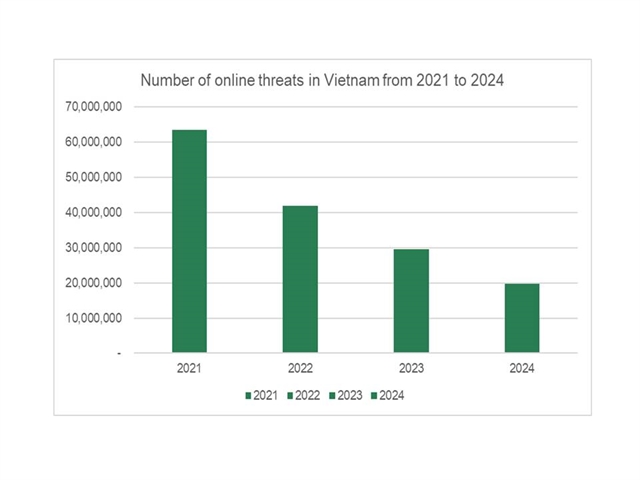 Economy
Economy

 |
| The number of online threats in Việt Nam from 2021 to 2024. — Source Kaspersky |
HCM CITY — Việt Nam has recorded a decline in web threats for four years in a row, according to global cybersecurity company Kaspersky.
The latest report from Kaspersky Security Network (KSN) shows that the company blocked over 19.8 million web threat incidents in Việt Nam in 2024. This is significantly lower compared to over 29.6 million detections in 2023.
Web threats refer to cyberattacks that exploit vulnerabilities in web browsers, plugins, and online platforms to deliver malware and other harmful content to unsuspecting users. The most common methods cybercriminals use to penetrate systems include drive-by downloads and social engineering attacks.
Drive-by downloads occur when users visit compromised websites that automatically download malware without their knowledge or consent, while social engineering attacks take place when cybercriminals deceive users into downloading malicious files by disguising them as legitimate programmes, often through phishing emails, fake websites, and misleading advertisements.
“Through the years, Việt Nam has made steady progress towards their cybersecurity goals as outlined in the Government’s resolution on information reassurance in 2025. The Global Cybersecurity Index 2024 even recognises Việt Nam's efforts with an impressive performance of 99.74. The country has also remained consistent in its public and private cooperation to boost Việt Nam’s cybersecurity capabilities, thus we can now see the results of these efforts,” said Yeo Siang Tiong, general manager for Southeast Asia at Kaspersky.
Despite the progress and successes in national cybersecurity, the country continues to face challenges from phishing and scams on browsers. There were an estimated VNĐ18.9 trillion in total losses from online scams by 2024, according to National Cybersecurity Association.
“In Việt Nam, a frequent technique of cybercriminals luring people onto infected websites is social engineering. Given the shared information on victims’ social media channels, malicious actors customise schemes to deceive them into phishing websites, tricking the victims that they are benefiting from those infected websites. More malevolently, AI is a powerful tool for deceiving people; criminals take advantage of the information that has been stolen to create numerous phishing schemes,” said Yeo.
“The fight against fraud is never-ending, demanding constant attention and proactive measures from all countries and organisations. Việt Nam has made significant progress in addressing cybersecurity challenges and can achieve even greater success by implementing cutting-edge cybersecurity solutions and robust anti-fraud strategies,” he added.
The company provides tips for organisations and individuals to keep themselves secure from cyberthreats.
For individuals, Kaspersky recommends they do not download and install applications from untrusted sources; remember to update software for optimal security layer; do not provide detailed information to strangers for any reason; do not click on any links from unknown sources; create strong and unique passwords; and use a robust cybersecurity solution appropriate to the system type and devices.
Businesses should use strong passwords to access corporate services, use multi-factor authentication for access to remote services; always keep software updated on all devices to prevent attackers from infiltrating networks by exploiting vulnerabilities; train employees on cybersecurity best practices; and use the latest threat intelligence information. — VNS




